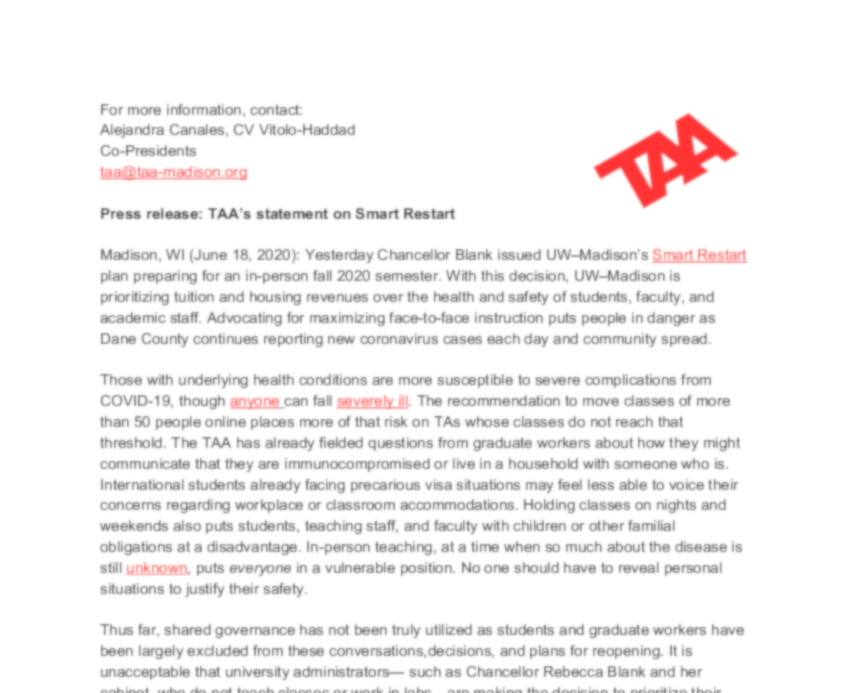TAA’s Statement on Smart Restart


For more information, contact:
Alejandra Canales, CV Vitolo-Haddad
Co-Presidents
taa@taa-madison.org
Press release: TAA’s statement on Smart Restart
Madison, WI (June 18, 2020): Yesterday Chancellor Blank issued UW–Madison’s Smart Restart plan preparing for an in-person fall 2020 semester. With this decision, UW–Madison is prioritizing tuition and housing revenues over the health and safety of students, faculty, and academic staff. Advocating for maximizing face-to-face instruction puts people in danger as Dane County continues reporting new coronavirus cases each day and community spread.
Those with underlying health conditions are more susceptible to severe complications from COVID-19, though anyone can fall severely ill. The recommendation to move classes of more than 50 people online places more of that risk on TAs whose classes do not reach that threshold. The TAA has already fielded questions from graduate workers about how they might communicate that they are immunocompromised or live in a household with someone who is. International students already facing precarious visa situations may feel less able to voice their concerns regarding workplace or classroom accommodations. Holding classes on nights and weekends also puts students, teaching staff, and faculty with children or other familial obligations at a disadvantage. In-person teaching, at a time when so much about the disease is still unknown, puts everyone in a vulnerable position. No one should have to reveal personal situations to justify their safety.
Thus far, shared governance has not been truly utilized as students and graduate workers have been largely excluded from these conversations,decisions, and plans for reopening. It is unacceptable that university administrators— such as Chancellor Rebecca Blank and her cabinet, who do not teach classes or work in labs—are making the decision to prioritize their revenue streams over the well-being of the students, staff and graduate workers.
Finally, while students, faculty, and staff are protesting and organizing in solidarity with the movement for Black lives in Madison, the Smart Restart plan speaks vaguely of the “equitable lens” that they created this plan with. However, it does not state who made the “equitable lens” nor how it is monitored. Elsewhere, colleges have not shown that they will include equitable pedagogy practices in their TA training in the fall, making it clear that the university refuses to move towards equitable and inclusive practices at any level. The TAA demands more than talk for equitable actions from our campus leaders.
UW–Madison administrators have the power and the responsibility to put the people that make this university run—its tradespeople, custodians, instructors, Research Assistants, staff, faculty, and student workers—above profit, but this decision tells us that they are unwilling to do so.
